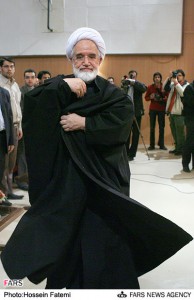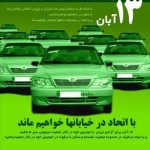NEW Iran: Rafsanjani Makes A Public Move with “Friendship Principles”NEW Video: Sharif Uni Protest Against Javad Larijani (4 October)You Make the Call: Leaked IAEA Report on Iran Nuclear ProgrammeThe Latest from Iran (3 October): Debating Mousavi’s StrategyReceive our latest updates by email or RSS SUBSCRIBE TO OUR FEEDBuy Us A Cup of Coffee? Help Enduring America Expand Its Coverage and Analysis
1705 GMT: Establishment Battles Resume?
Parleman News is claiming that supporters of President Ahmadinejad have tried --- and failed --- to unseat Speaker of Parliament Ali Larijani as the head of the Principlist majority group. If true, this could be a sign that the temporary reconciliation of conservative and principlist factions, prominent at the start of September with the approval of the Ahmadinejad Cabinet, may be breaking down.
And that in turn raises the question: is this split being fostered by the imminence of a National Unity Plan which may seek to marginalise Ahmadinejad?
1640 GMT: We think Hashemi Rafsanjani's statement, which we noted here earlier, is important enough to warrant
a separate entry.
1625 GMT: The Unity Gesture? EA's Mr Smith predicted that this step would occur in the Supreme Leader's speech at the end of Ramadan on 20 September. Looks like he was only two weeks off: "
Iran is to release on bail around 20 people accused of post-election violence, including top reformists and an Iranian-American scholar."
According to the Islamic Republic News Agency, citing a source inside Iran's judiciary, those who may be freed include former Vice President Mohammed Ali Abtahi, journalist Mohammad Atrianfar, reformist leaders Shahab Tabatabaei, Saeed Shariati and Abdollah Momeni, and Iranian-American academic Kian Tajbakhsh.
1430 GMT: Pointless Analysis of Day. A Jeffrey Kuhner, the declared President of the "Edmund Burke Institute", is allowed to
take up space in The Washington Times with this: "War with Iran is now inevitable. The only question is: Will it happen sooner or later?"
1240 GMT: Good Cop, Bad Cop. Speaker of Parliament Ali Larijani
has provided the critical counterpoint to the positive signals from this morning's briefing by IAEA head Mohammad El-Baradei (0905-0920 GMT):
The [IAEA] is an international authority which should supervise all nuclear activities of states, but the agency's records indicate that it was not successful in this regard for political reasons. The agency acted successfully with regard to nuclear activities in certain places like Japan, but it bowed [to pressure] where it faced political barriers and proved unsuccessful.
The head of Iran's nuclear programme, Ali Akhbar Salehi,
sounded a different tune after his press conference with El Baradei. Confirming the late October inspection date for the second enrichment plant and discusions on "third-party enrichment", he said, “As far as safeguards are concerned, Iran's nuclear issue has been fully resolved."
1200 GMT: Report that two members of the reformist student group Daftar-Tahkim-Vahdat (Unity Consolidation Bureau)
are still in Evin Prison, with 16 released yesterday. Original reports were that there were 15 detainees, and
all were freed.
0920 GMT: El Baradei calls for Iran to rejoin the Subsidiary Protocol (Code 3.1) of the Nuclear Non-Proliferation Treaty, which provides a stricter framework for inspection and monitoring. Iran left the Protocol in 2007 after a dispute with the IAEA over access to information on military programmes as well as the nuclear facilities.
0915 GMT: El Baradei says, "All in all, a positive development," but he reiterates, "I have been saying for a number of years we need transparency on the part of Iran and cooperation on the part of the international community." This is "the critical moment...shifting gears from confrontation into transparency and co-operation".
0910 GMT: El Baradei praises Iran "very positive" response on both the question of access to the second enrichment facility and "third-party enrichment" of low-grade uranium for radiomedicine use.
The date for inspections of the facility near Qom is 25 October.
0905 GMT: IAEA head El Baradei and the head of Iran's nuclear programme, Ali Akhbar Salehi, are now briefing the press on their discussions in Tehran.
0620 GMT: There is little information on the biggest story in Iran because talks on the draft National Unity Plan have gone very private. For example, little has been heard from Mehdi Karroubi, for a week, possibly because discretion is needed in this critical period of negotiations.
There is also little so far on the visit of International Atomic Energy Agency head Mohammad El Baradei to Tehran
beyond the Iranian insistence that this has nothing to do with the Geneva talks and is instead aimed at the "continuation of cooperation to supply fuel for Tehran research reactor which produces radiomedicine".
We are left instead with overheated "revelations" on Iran's nuclear programme. Once again, it's David Sanger and William Sanger of
The New York Times who are leading the rush
with the headline, "Report Says Iran Has Data to Make a Nuclear Bomb", soon picked up by everyone from
Reuters to
Fox News. The report in question, a study by IAEA experts, says that "sufficient information to be able to design and produce a workable implosion nuclear device based upon HEU [highly-enriched uranium] as the fission fuel".
Now note that this does not mean that Iran has embarked on the process of putting highly-enriched uranium into a warhead. It does not indicate that Iran has embarked on the process of converted low-yield uranium into highly-enriched uranium. It does not establish that Iran has enough low-yield uranium to produce the HEU for a Bomb. It does not even say that Iran has a design for a nuclear weapon. It only says Iran has "sufficient information".
This, however, is enough for Broad and Sanger to pretend that this is a dramatic revelation of a super-secret plot, as the information "go[es] well beyond the public positions taken by several governments, including the United States". And it is the platform for them to take a swipe at El Baradei for refusing to make the study public.
Heck, the extracts from the study are not even "new". They were revealed in an Associated Press article by George Jahn on 17 September. What is significant is the timing of the Broad-Sanger piece, published less than 72 hours after the Geneva talks. If they really wanted to give us some meaningful information, they would reveal whether their Page 1 quest started with a reading of the Jahn piece, notice of
a 2 October report by the Institute for Science and International Security (which mentioned Jahn's article and published extracts of the IAEA report, but which is only mentioned deep in
The New York Times piece --- we've posted full text
in a separate entry), or a helpful pointer from an Administration source.
It's perfect fodder for bang-the-war-drum headcases like Elliott Abrams, the former Deputy National Security Advisor under George W. Bush and convicted criminal in the Iran-Contra scandal. Here's Abrams explaining that "most Iranians" would accept a military attack on their country:
[youtube]http://www.youtube.com/watch?v=OLYujym5wNU&feature=player_embedded[/youtube]
 Wednesday, October 14, 2009 at 16:25
Wednesday, October 14, 2009 at 16:25  From an Enduring America correspondent inside Iran:
From an Enduring America correspondent inside Iran: From an Enduring America correspondent inside Iran:
From an Enduring America correspondent inside Iran:
 1930 GMT: The reformist Assembly of Combatant Clergymen, paralleling the statements of Mohammad Khatami,
1930 GMT: The reformist Assembly of Combatant Clergymen, paralleling the statements of Mohammad Khatami, 
